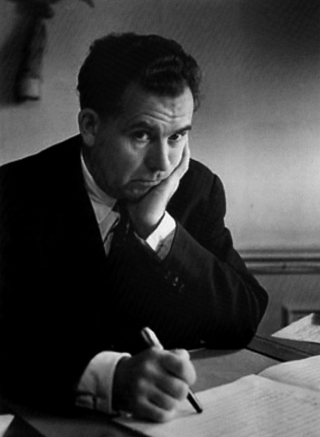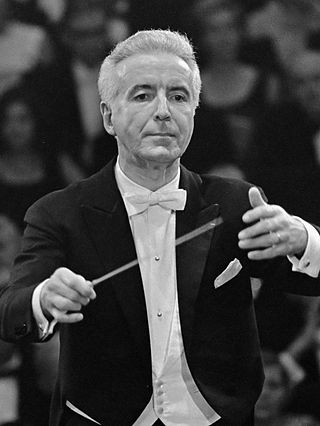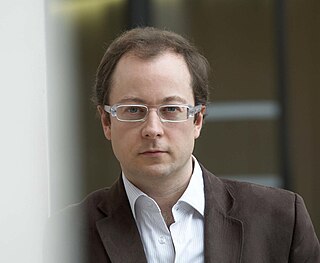
Michel Rateau (born 4 September 1938 in Paris, France) is a French composer.

Michel Rateau (born 4 September 1938 in Paris, France) is a French composer.
Michel Rateau began studying solfège and piano at the age of five at Notre Dame de France in Vanves, France. At the same age, he composed his first work in his parents' kitchen using everyday objects.
Rateau attended a number of music courses throughout his childhood, studying under Sister Marie-Laurent up to the age of 11; then taking private piano courses with the organist Jean Boguet up to the age of 15. He then attended the classes of Jacques Février and Jean Doyen.
Attracted to Composition, Rateau enrolled in the Conservatoire de Paris in 1959. He attended the classes of André Jolivet and Jean Rivier and begin studying under the supervision of the CNSM Professor of Harmony, Maurice Duruflé. He passed the Musical Education, CAPES (upper national teaching diploma) in 1960 and carried out National Military Service in the Band of the 93rd Infantry Regiment at Mont Valerien from 1962 to 1964.
Rateau was awarded the First Prize of Harmony in 1963 and the First Prize of Composition in 1966 from Paris CNSM. In 1967 he won Premier Grand Prix de Rome, a French national upper artistic award allowing the winner to spend time at the Villa Medici in Rome, Italy. [1]
Rataeu lived at the Villa Medici from 1968 to 1971. Shortly after his return to Paris, he turned his focus to sounds emitted by unconventional instruments (such as bird cage, pipes, and tanks) and recorded them on magnetic tapes. This led to the score of “’La Course’” (The race) a ballet for the Paris Théâtre National Populaire (TNP) performed by Joseph Russillo’s company and a concert at the Musée d'Art Moderne de la Ville de Paris within the frame of the A.R.C. (Animation, Research, Confrontation) ordered by Maurice Fleuret. Throughout these years, Rateau continued to compose orchestral scores.
As reported by Billboard in 1975, Rateau instigated a new musical style founded on what the composer called "sounds of nature and every-day life". The report said "he has recorded the sounds of printing machines, car engines, pots and pans, garden tools, and claims it is not musique concrete but music composed and arranged on tape by the elements producing the sound." [2]
In 1976, Rateau settled in Rouen, and resumed his teaching activities at the Rouen IUFM (Institut Universitaire de Formation des Maîtres – i.e. University Institute for Teachers' Training). He also taught at the Rouen Institute of Musicology from 1980 to 1989 and at the École Normale de Musique de Paris from 1983 to 1990, as a teacher of harmony and analysis.
In 1982 Rateau started the “Chants du Temps” (Time songs) for orchestra which he finished in 1988.
While teaching full-time, he had “Offrande Lyrique” (Lyrical offering) for violin and orchestra played in concert at the Salle Gaveau in Paris in 1984 by Ensemble orchestral de Paris (The Paris orchestral group) conducted by Jean-Pierre Wallez with Gaëtane Prouvost as a solo violin. To his joy, Maestros Olivier Messiaen and Henri Dutilleux attended this concert. The Rouen Chamber Orchestra played this work again in 1984, conducted by Jean-Pierre Berlingen.
For the 25th anniversary of Rouen University in 1991, he composed a “quatre” for flute, clarinet, violin and piano for the Nouvel ensemble Contemporain (The New Contemporary group), created in concert in 1991.
In 1992 Rateau began “Les Chants du Temps” for the piano, his Journal Musical (Musical Diary), “a work in progress of unachievement”. “Chants du Temps” returned to a very simple, quite purified, strongly melodic, and contrapuntal form of writing, which contrasts radically with the pioneering pieces he wrote in 1960-1970. It consists of a modulable composition in fifteen volumes, each volume enclosing twelve books and each book containing twelve pages of music. Like a collection of poems, according to his mood and his preferences, the reader-interpreter will choose pieces to be read or played without restraint.
Part of the “Chants du Temps” was played in concert at the University of Strasbourg in April 2005, on the occasion of the Cultural Action Days. The Israeli pianist Gilead Mishory has played some extracts of this work in concert in Germany and Japan.

Gérard Henri Grisey was a twentieth-century French composer of contemporary classical music. His work is often associated with the Spectralist Movement in music, of which he was a major pioneer.

André Jolivet was a French composer. Known for his devotion to French culture and musical thought, Jolivet drew on his interest in acoustics and atonality, as well as both ancient and modern musical influences, particularly on instruments used in ancient times. He composed in a wide variety of forms for many different types of ensembles.

Jean Francisque-Étienne Martinon was a French conductor and composer.

Jean Fournet was a French flautist and conductor.
Michel Decoust is a French composer and conductor.

Albert Dupuis was a Belgian composer.

Maximilien-Paul-Marie-Félix d'Ollone was a 20th-century French composer.
Jean-Michel Damase was a French pianist, conductor and composer of classical music.

Maurice Jaubert was a prolific French composer who scored some of the most important films of the early sound era in France, including Jean Vigo’s Zero for Conduct and L'Atalante, and René Clair’s Quatorze Juillet and Le Dernier Milliardaire. Serving in both world wars, he died in action during World War II at the age of 40.
The Trio Wanderer is a French piano trio made up of Vincent Coq, piano, Jean-Marc Phillips-Varjabédian, violin, and Raphaël Pidoux, cello, who graduated from the Conservatoire de Paris. In 1988 they won the ARD International Music Competition in Munich, and in 1990 the Fischoff National Chamber Music Competition in the US.
André Bon is a French composer. A student of Olivier Messiaen, he has composed over fifty works including several chamber operas. He is Professor of Composition at the Argenteuil Conservatory.

Oscar Strasnoy is a French-Argentine composer, conductor and pianist. Although primarily known for his stage works, the first of which Midea (2) premiered in Spoleto in 2000, his principal compositions also include two secular cantatas and several song cycles.

Édith Lejet is a French composer and music educator.

Thierry Joseph-Louis Escaich is a French organist and composer.

Guillaume Connesson is a French composer born in 1970 in Boulogne-Billancourt.

Guy Morançon is a French composer and organist.
Michel Merlet is a French composer and pedagogue.

Antoine-Barthélémy Taudou was a French music educator, violinist and composer.

Pierre Georges Cornil Jansen was a French film scores composer. He was in particular the permanent collaborator of Claude Chabrol for whom he composed the music for many films.

Jacques Bondon was a French composer.